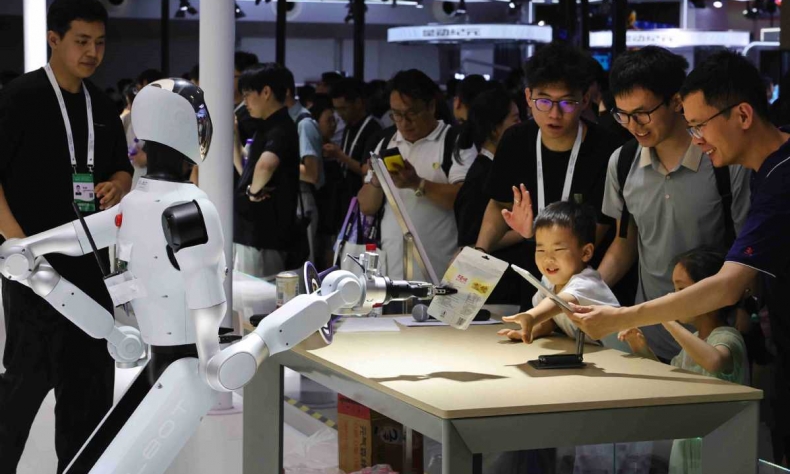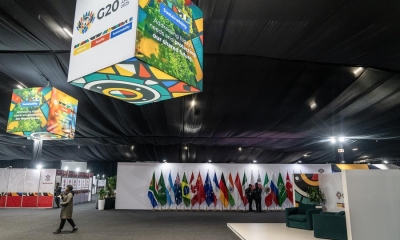China’s AI Vision Offers Alternative to Western Control

Like it or not, China’s approach, especially its willingness to share knowledge and promote open-source collaboration, is gaining traction, particularly among Global South nations.
The Chinese government has called for creating a global AI cooperation organization — tentatively to be headquartered in Shanghai — building on President Xi Jinping’s 2023 proposal for the Global Artificial Intelligence Governance Initiative.
Premier Li Qiang announced the plan during his address at the opening ceremony of the 2025 World AI Conference and High-Level Meeting on Global AI Governance on July 26. The three-day event was themed “Global Solidarity in the AI Era.”
China’s call comes amid intensifying competition among the United States, the European Union and the United Kingdom that has left global efforts to regulate AI fragmented. Yet despite the competition, there is shared international interest in stepping up AI exchanges and cooperation as well as addressing existential risks posed by AI, including misinformation, deepfakes and unchecked proliferation.
Countries must urgently agree on how to balance AI progress with security. As AI becomes embedded in critical aspects of daily life, such as public services, health care, finance and national defense, societies face the dual challenge of advancing innovation while managing complex risks.
Addressing these issues requires inclusive dialogue among governments, industry leaders, researchers and civil society. The goal must be to ensure AI develops responsibly, ethically and in alignment with the public interest and global stability. There is growing recognition that AI governance should not repeat the pattern of the Western-dominated global financial system. Instead, it must follow a multipolar approach to prevent any single bloc from unilaterally shaping the future of this transformative technology.
China envisions the proposed organization as a comprehensive, inclusive platform for international AI cooperation. It aims to foster broad-based participation that reflects the diverse priorities of nations across the globe. A key objective is to address the growing “AI divide,” the technological gap between advanced economies and developing nations. Without coordinated action, developing countries risk being further marginalized in the accelerating global AI race, deepening existing inequalities.
The initiative emphasizes pragmatic, action-oriented collaboration to translate shared objectives into tangible outcomes. China seeks to unite nations to promote innovation, share technological expertise and coordinate AI-related policies in a spirit of mutual benefit.

The proposed organization would also work to unlock the transformative potential of AI across sectors such as health care, education, agriculture and industry. China hopes this will catalyze more equitable global development, promoting inclusive growth, shared prosperity and stability in an increasingly interconnected digital world.
The fragmentation in global AI governance stems largely from the dominance of a few powerful countries pursuing narrow national interests. For decades, the West has disproportionately benefited from technological progress. However, the emergence of China, India and several innovation-driven Global South countries is beginning to challenge this status quo.
Now is the time for the international community to align efforts toward establishing a robust, consensus-based framework for global AI governance that equitably serves all nations’ interests.
China is taking the lead by inviting interested countries to participate in shaping the proposed organization’s structure and agenda. This exemplifies the country’s commitment to advancing both multilateral and bilateral cooperation, a strategic yet inclusive approach.
The proposal also signals China’s shift from passive participation to active contribution in global AI rule-making. China’s established track record in AI capabilities, including large language models, facial recognition and industrial applications, positions it as a credible leader.
Beyond governance leadership, the country is also offering to share its technologies, resources and insights with the international community. This includes providing training, infrastructure and technology transfer to support other nations. By doing so, China contributes to balanced and equitable development of the global AI governance.
This commitment to sharing extends to open-source development, reflecting a dedication to shared growth over control or profit. Such cooperation signals a willingness to empower other countries through collaborative innovation, particularly in the Global South.
China has consistently promoted international cooperation in both software and hardware technologies, recognizing that addressing global AI challenges requires collective action. It aims to democratize access to advanced tools, frameworks and platforms through joint research, technical partnerships and knowledge exchange.

This strategy aligns with China’s broader vision of inclusive technological growth, emphasizing key principles such as “AI for good,” fairness, respect for national sovereignty and the development of non-discriminatory global standards.
Facilitating cross-border research collaboration is another primary goal. Such efforts reinforces China’s image as a constructive global partner.
Yet a key question remains: Can a truly inclusive AI governance framework be built in a deeply divided geopolitical landscape? Like it or not, China’s approach, especially its willingness to share knowledge and promote open-source collaboration, is gaining traction, particularly among Global South nations. These countries increasingly view China’s initiative as advocating a transparent and reliable partnership, unlike traditional Western frameworks that often come with geopolitical strings attached.
China believes that by providing access to advanced AI tools, it can forge stronger political and economic ties through technology-driven diplomacy. In contrast, many Western powers favor restricting AI access to preserve strategic advantage and profit through technological concentration.
As the AI race accelerates, the architecture of global technology governance is undergoing a profound transformation. China’s latest proposal is more than a call for cooperation; it is a strategic move to shape how AI is regulated, applied and understood globally.
Ultimately, the success of this initiative will depend on uptake, particularly among Global South nations. These countries will play a decisive role in determining whether a truly multipolar AI governance structure emerges or whether current Western-dominated frameworks continue.
As it steps up its effort to advance global AI governance, showcasing its growing capabilities, China will attract increasing numbers of interested nations to work together in establishment of the AI organization. This will, in the long run, contribute to building a global community of a shared and brighter future and benefit the whole world, including the U.S. and other Western countries.
Maya Majueran is the director of BRISL, an independent and pioneering Sri Lankan-led organization, with strong expertise in BRI advice and support.
 Facebook
Facebook
 Twitter
Twitter
 Linkedin
Linkedin
 Google +
Google +







